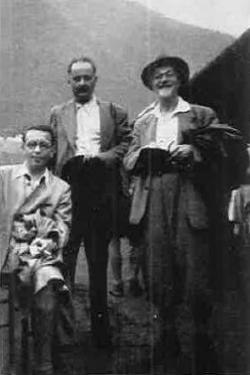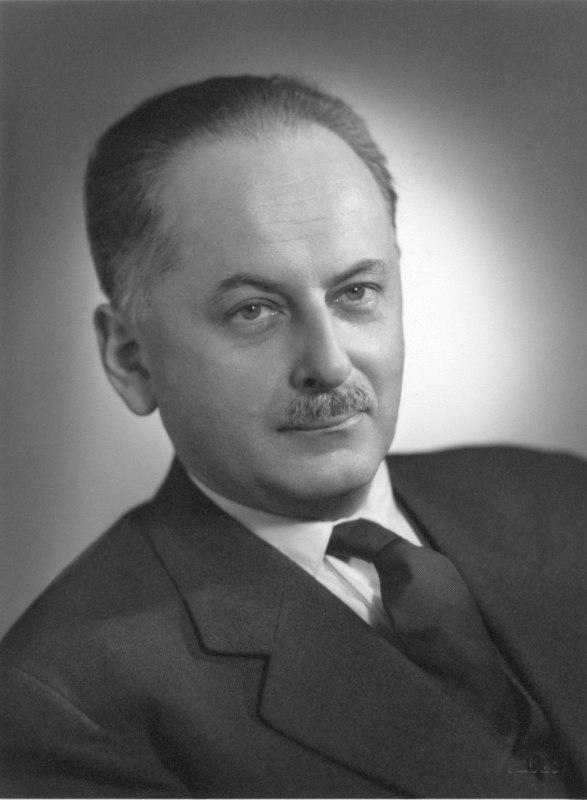Willibald Plöchl, Prof. Dr.
Honors
| Ehrung | Titel | Datierung | Fakultät | |
|---|---|---|---|---|
| Monument | Willibald-Plöchl Gedenkstein | 2007 | Faculty of Catholic Theology |
|
Functions
| Dean | Faculty of Law and State | 1953/54 |
| Dean | Faculty of Law and State | 1962/63 |
- Legal Science
- Legal History
- Canon Law
- Faculty of Law and State
Plöchl, the son of a secondary school teacher, studied at the Konsularakademie in Vienna (today the Diplomatic Academy of Vienna) beginning in 1926 and graduated in 1928. In 1927 he also began studying law at the University of Vienna, where he became Doctor of Jurisprudence in 1931. Already in 1926 he had joined the “Reichsbund der Österreicher” (“association of Austrians”), where he several times also was a member of the board. After his studies, he entered the administrative service at the provincial government of Lower Austria and passed the administrative service exam in 1934. Being close to political Catholicism, he joined the Christian-Social Party in 1932 and became Bundessenior (federal senior) of the Österreichische Landsmannschaften (association of Catholic fraternities) in 1933, as well as being a staff member and editor of the Reichspost-newspaper. During Austro-Fascism, in 1935, he habilitated for canon law at the University of Vienna.
Because of Plöchl’s affinity to the authoritarian corporative state as well as his activity against National Socialism in the Landsmannschaften, he was persecuted after the “Anschluss” and lost all functions. The ministry of education rescinded his teaching license at the University of Vienna as of April 22nd, 1938, and he was fired from his position as Landesregierungskommissär (commissioner of the provincial government) at the end of November 1938 under §4 of the career civil servant act (standing for political reasons).
After also being incarcerated for a short time, Plöchl emigrated to the Netherlands in September 1938. The next year, he received a teaching assignment at the University of Nijmegen, before further emigrating to Paris in September 1939. Here he contributed to the “Ligue Autrichienne”. After France was occupied by Nazi Germany, Plöchl fled again, this time through Portugal to the United States. From 1941 to 1947 he was able to teach as a visiting professor at the Catholic University of America in Washington, D.C. He remained politically active and together with Hans Rott founded the “Free Austrian National Council” (FANC) in September 1941. It was based in Toronto, Canada, and saw itself as the legal successor of the Schuschnigg-government. Due to protests by socialists who had emigrated to the USA, the US-government denied the FANC its recognition. Plöchl himself had conflicts with Rott as well as Otto Habsburg. Meanwhile, in 1943, he advanced to the function of legal advisor for Austria at the State Department, a position he held until 1945.
In November 1947 Plöchl returned to Austria and again began work in the administrative service of Lower Austria. He also returned to his teaching position at the University of Vienna and became full professor for canon law as well as chairman of the institute for canon law at the faculty for law in 1948. At the University of Vienna, he also collaborated on several panels and was in charge of the Universitätsturnanstalt (institute for physical education) as well as the summer college for American students. The latter was held regularly beginning in 1949 and Plöchl himself held lectures on Austrian and diplomatic history.
He also held other important positions in the Second Republic, such as dean of the University of Vienna (1953/54 and 1962/63), president of the Staatsprüfungskommission (commission for state exams) for legal history (until 1969), vice president of the Katholische Akademie (Catholic Academy, until 1973), president of the Gesellschaft für das Recht der Ostkirchen (Society for law of Eastern Churches, from 1969) as well as chairman of the Arts Council of Lower Austria (from 1974).
Plöchl was a founding member of the Österreichische Gesellschaft für Kirchenrecht (Austrian Society for Canon Law), corresponding member of the Austrian Academy of Sciences, member of the board of trustees of the Dokumentationsarchiv des österreichischen Widerstandes (Documentation Center of Austrian Resistance) as well as bearer of numerous awards: He received the Grand Decoration of Honor in Silver (1963), the Commander’s Cross with star of the papal order of St. Sylvester (1965), the golden Commander’s Cross of the federal province of Lower Austria (1968), the Cross of Honor for Science and Art, First Class, honorary doctorates from the University of Thessaloniki (1969) and the University of Innsbruck (1970), the large Kardinal Innitzer award (1972), the Leopold Kunschak award (1972) as well as the Decoration for Services to the Liberation of Austria (1978).
Plöchl was an expert on oriental canon law and had close contacts to Patriarch Athenagorras. Furthermore he was known as a supporter of the ecumene. Among his most famous works are “Das kirchliche Zehentwesen in Niederösterreich” (1935), „Geschichte des Kirchenrechts“ (5 volumes, 1953-1969) and „Die Geschichte der griechisch-katholischen Kirche und Zentralpfarre St. Barbara“ (2 volumes, 1975). He was publisher and co-publisher of the “Österreichisches Archiv für Kirchenrecht“ and the “Wiener rechtsgeschichtliche Arbeiten“.
Archiv der Universität Wien, Rektoratsakten, GZ 677-1937/38. | Österreichisches Staatsarchiv/Archiv der Republik, Bundeskanzleramt, Bestand „Berufsbeamtenverordnung“ (BBV).
Zuletzt aktualisiert am 09/02/21
-

Members of the faculty of the Summer School of the University of Vienna, 1952
Group picture with members of the faculty of the Summer School of the University of Vienna in 1952. According to the caption: Josef Lehrl, Willibald...
-

Willibald Plöchl (middle) with Heinrich Ritschl (left) and Johann Sölch
Related content
-
Law and Economics, part II
1893–2015
-
Law and Economics, part II
1893–2015


